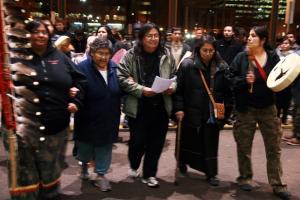In November of last year, Indigenous activists and allies from across Canada came together in Winnipeg to form Defenders of the Land, a network of Indigenous communities and activists in land struggle across Canada.
Out of this network came a call for a pan-Canadian event, Indigenous Sovereignty Week, which is now upon us. Close to 30 cities and communities across Canada (and even a few in the United States) will be holding public events from Oct. 24 to Nov. 1.
The purpose of this week is to build local relationships between groups and individuals, disseminate ideas and generally contribute to building a cross-Canada movement for Indigenous rights, self-determination, and justice that is led by Indigenous communities but with a broad base of informed support.
Activities throughout the week include: speakers, panels, workshops, films, community tours, feasts, and performance art, music, and spoken word. A wide range of issues will be covered, but relate to four main themes: Struggles for Indigenous rights and self-determination; Indigenous knowledge, culture and identity; Indigenous peoples and the environment; history of Indigenous-Canadian relations.
Arthur Manuel is an Indigenous activist who will be part of the ISW speakers tour, visiting different communities on different days to help educate people and spread the word.
Manuel is from the Neskonlith Indian Band of the Secwepemc Nation (in British Columbia), and is leader of the Indigenous Network on Economies and Trade, which works with people on the community level and also internationally towards recognition of Aboriginal title and treaty rights.
Having been in the struggle his entire life and generations before (he’s the son of George Manuel, one of the first presidents of the National Indian Brotherhood, which later became the Assembly of First Nations), Manuel has become involved with Defenders of the Land and Indigenous Sovereignty Week because he sees the importance of activists standing up to the government and educating the public, “I believe that establishment Indian organizations, [through] the courts and all that, we’ve actually pushed the system as much as we can through establishment mechanisms.”
Manuel adds, “We’ve won the past 20 years: constitutionally, judicially, internationally [United Nations Declaration on the Rights of Indigenous Peoples — UNDRIP], economically [WTO ruling on Aboriginal title and treaty rights], but we haven’t been able to get recognition on the ground” on issues such as mining, the tar sands, and the development of ski resorts.
Manuel feels that community-based resistance is what is needed, “That’s where the real pressure is, for pushing the government — through action.” For examples of effective action, he cites the examples of Kitchenuhmaykoosib Inninuwg (KI) protests (in Northern Ontario) against platinum drilling (which led to jail time for six KI leaders and then an overturning of their sentences) and also the resistance to the Sun Peaks Ski Resort in Secwepemc Territory, just outside of Kamloops, B.C.
He also emphasizes education and outreach, and stresses the position of the Canadian government in not signing the UNDRIP nor respecting Aboriginal rights:
“The real question is, ‘do Canadians really accept what Canada is doing? They’re undermining Canadians’ credibility regarding human rights. You can’t cherry pick: if you believe in human rights, you believe in them across the board. Accepting the UNDRIP is a question of maturity: are we a mature country of settlers and Indigenous people sitting down to deal with these issues?”
Arthur Manuel has a clear idea of where real change with respect to Indigenous rights is going to come from.
“The real people who are going to raise those questions are activists. Establishment organizations are not being taken seriously because they literally are taking too much [political] money from the government.”
Greg Macdougall is active in Ottawa with IPSMO (Indigenous Peoples Solidarity Movement Ottawa). He is also a member of Common Cause, the provincial anarchist organization and runs the EquitableEducation.ca project.



